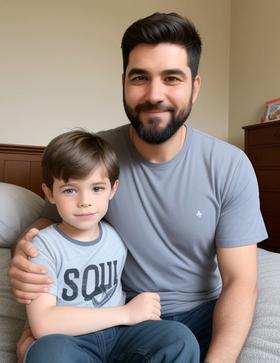Что такое хорошо и что такое плохо – диалог на английском

В диалоге между пятилетним сыном и отцом решается вопрос о том, что такое хорошо и что такое плохо. Отец объясняет, что добрые дела приносят радость и помогают другим, а плохие причиняют вред, боль и страдания. В качестве примеров хорошего поведения он приводит игру с друзьями, помощь другим людям и честность. Он с пониманием относится к признанию сына в том, что он случайно (или не очень?) сломал куклу сестры. Отец объясняет, что нечаянно сломанная игрушка не делает человека плохим, хотя это нехорошо. Отец поддерживает сына и обещает помочь в решении проблемы со сломанной куклой сестры и поясняет, что очень важно извиниться и исправить свою оплошность. Сын благодарит отца за этот разговор и говорит, что все понял. Диалог помогает отцу и сыну лучше понимать друг друга, а мы учимся у них вести доверительную беседу по-английски.
Обратите внимание на правила написания слов Mother (Mom), Father (Dad, Daddy), Son, Daughter с большой буквы. Если они используются в обращении к человеку вместо имени, то пишутся с большой буквы. Если же происходит простое описание родственных связей, то слова начинаются со строчной буквы. Но надо сказать, что соблюдаются эти правила не всегда и носители с ними тоже путаются.
A Father and His Son Talking About Good and Bad Things
A five-year-old son comes to his father and wants to ask him about something.
Father: Hey buddy, what's on your mind today?
Son: Daddy, I was thinking about something. Can you tell me, what is good and what is bad?
Father: Ah, that's a great question! Well, let me try my best to explain it to you. You see, good deeds are those that make people happy and bring joy or help others. Bad deeds are those that hurt people, make them sad, or are not kind.
Son: So, playing with my friends is good?
Father: Yes, absolutely! Playing with your friends is a good activity because it brings joy to everyone involved. It helps you build relationships and have fun together.
Son: But what if I accidentally(1) broke someone’s toy? Is that bad?
Father: Breaking something accidentally doesn't make you a bad person, but it's not a good thing. It is important to take care of our own and other people's toys and belongings, and it's always nice to be honest(2), apologize, and to make things right when we make a mistake.
Son: Does that mean telling lies is bad?
Father: Yes, telling lies is considered bad. Honesty is a good thing because it builds trust between people. When you tell the truth, people know they can rely on(3) you, and that's important in any relationship.
Son: I must confess(4), Daddy, I accidentally broke Jane's new doll, but I'll do my best to fix it(5).
Father: Thank you for being honest with me, buddy(6). That's the first step in making things right. Now, let's think about how we can fix the situation. How about we talk to your sister Jane and apologize for breaking her doll? Maybe we can find a way to fix it or even replace it if necessary.
Son: Thanks, Daddy. I feel bad about it, but I will talk to Jane and say sorry. I want to make it right.
Father: That's a very mature and responsible decision(7), Son. I'm proud of you. Remember, everyone makes mistakes, but it's how we handle them and take responsibility that matters. And don't worry, I’ll support you when you talk to Jane and help you find a solution.
Son:What about sharing my toys, Dad? Is that good?
Father: Oh, definitely! Sharing your toys is a fantastic thing to do. It shows kindness and generosity(8) which makes other people happy. Sharing is always a good way to make friends and bring smiles to people's faces.
Son:I see, Dad. And what if I help someone who has fallen, is that good too?
Father: Sure! Helping someone who needs assistance is one of the best things you can do, my boy. It's always important to lend a hand to those who need it, whether they tripped or are struggling with something. It brings joy to both you and the person you help.
Son: I think I understand now, Daddy. Doing good things makes people happy and helps them, while bad things make people sad or cause harm.
Father: That's exactly right! You've got it. Always remember to try your best to do good things, even though we all make mistakes sometimes. The important thing is to learn from those mistakes and keep growing to become an even better person.
Son: I will, Dad! Thank you for explaining good and bad to me.
Father: You're very welcome, my little champ. I'm always here to help you understand the world around you.
^1accidentally – случайно, нечаянно
^2honest – честный
^3rely on – полагаться, надеяться на кого-либо
^4confess – признаться
^5I'll do my best to fix it. – Я сделаю все возможное, чтобы исправить это.
^6buddy – приятель, дружище
^7mature and responsible decision – взрослое и ответственное решение
^8generosity – щедрость
Вопросы к диалогу отца и сына
- How did the son initiate the conversation about good and bad?
- How does the father define good things?
- How does the father define bad things?
- Can you give an example of a good thing that the son mentioned?
- What was the son's question about accidentally breaking his sister's toy?
- How does the father respond to the son's question about breaking his sister's toy?
- Does the father consider accidentally breaking the toy as a bad thing?
- Why does the father emphasize the importance of being careful and apologizing?
- How does the father define honesty?
- Why does the father encourage the son to be honest?
- What does the son confess to his father?
- How does the father react to the son's confession?
- What suggestion does the father offer to the son to make things right?


